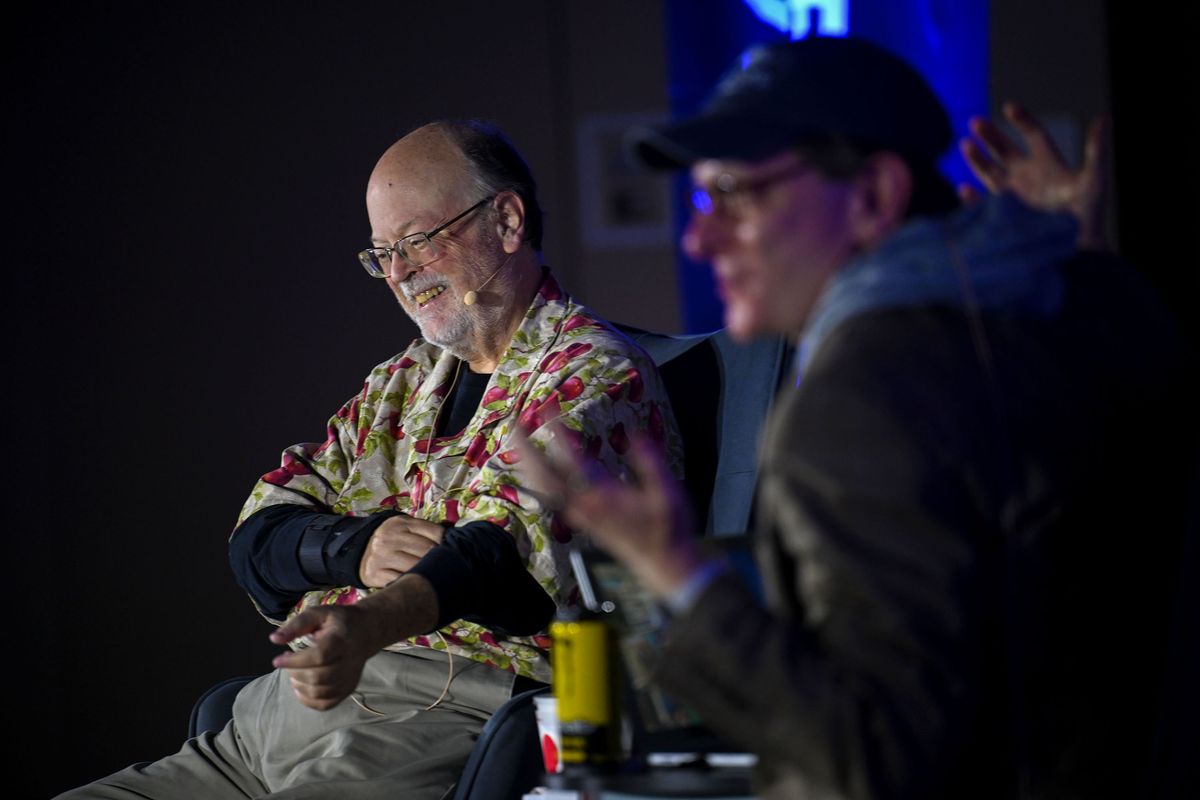Veteran journalist and Further Review author, designer talks serendipity and ‘pure dumb luck’ at Northwest Passages book club event

After authoring and designing pages on myriad topics from “The Star -Spangled Banner” to Chick-Fil-A and Henry Ford’s quadricycle, you’d think Charles Apple would run out of topics to feature in his Further Review series.
Not so, as The Spokesman-Review contributor continues to publish four times a week a full-page spread diving deep into his chosen subject. Perhaps there’s an anniversary coming up, maybe a new pop culture sensation, these and more have influenced Apple in selecting featured topics, no matter how niche.
Now, he’s taken on a new endeavor. The journalist selected around 100 of his favorite Further Review pages and after a little design editing, compiled them into a newly released coffee table book.
Clad in an apple print shirt sewn by his wife, Apple joined The Spokesman-Review Editor Rob Curley for a Northwest Passages book club interview on Sunday.
The two journalists, who first worked together at the Orange County Register in California after knowing each other for much of their careers, discussed the book, how Apple got his start in journalism and how that led to where he is now, autographing his own book for the first time in his life.
Authoring a book was a lifelong goal of Apple’s whose extensive journalism career included sportswriting, cartooning, page design and, as many in the industry understand, layoffs.
“The idea was to say goodbye to newspapers forever, I’m finally going to write the book I’ve always wanted to write,” Apple thought after the Houston Chronicle laid him off in 2018.
Though this book is much different than the one he’d planned to author, Further Review fans were pleased to get their hands on hard -copy compilations of Apple’s informative and visually engaging pages.
Apple first dipped his toes into the waters of journalism through a homework assignment in middle school, A teacher assigned his class to cover a school football game like a newspaper article.
Apple regularly read his local paper, particularly drawn to any reports on NASA launches.
“Then I start reading the other stories, then I discover the comics, and I discover the sports and I discover sports agate and just fall in love with newspapers,” he said.
Because of this exposure, sportswriting came naturally to him, and the homework assignment serendipitously ignited his interest in journalism as a career.
“When I wrote my story, I wrote it like a newspaper story should be,” Apple recalled. “I turned it in, didn’t think about it, and a couple hours later, (my teacher) chases me down the hallway and says, ‘I’m going to send your story to the Messenger.’ ”
After that, eighth-grade Apple became a recurring voice in the Messenger, his town’s local newspaper. The rest was history.
His work has taken him to newsrooms in South Carolina, Virginia, and South Africa, but Spokane’s newspaper market is different, he said.
“Are you guys aware you live in the greatest town in the nation?” He asked the audience, who quickly applauded in answer.
Throughout his career across the country and overseas, Apple said he and his work was infrequently recognized. Sometimes he’d buy copies of his newspaper for employees of stores to point out his work.
“Nobody ever saw it unless I pulled it out and showed it to them,” he said.
The same cannot be said for Spokane. When visiting, folks young and old recognize his name or are familiar when he mentions what he does at The Spokesman. “You’re the Further Review guy?” people ask.
“Last time I was here, I mean that must have happened like 12 times, like the three days or whatever it was. It was crazy,” Apple said.
Though celebrated locally, Further Review’s reach sprawls much farther than Spokane.
Further Review is syndicated for free to around 250 papers nationwide, delivering original Apple insights and designs around the nation.
He scrounges for photos from public domain sources, working with a budget of $0. One of his main sources of free content is the U.S. government. He scours the National Archives, Library of Congress and creative commons websites for content he can use on his pages.
“It’s federal money, so if Uncle Sam paid for it, I can use it,” Apple said. “So I got pretty good at that.”
The audience, several who self-described as nerds for design or Apple’s “biggest fans,” soaked up the banter between Apple and Curley and then asked questions of their own.
Asked what the most surprising discovery throughout his Further Review career, of which Apple has written and designed over 1,000, Apple replied with an anecdote from when he was researching for a page on the discovery of the double helix structure of DNA.
On an online bookselling site, he purchased an early version of the biography of James Watson, who received a Nobel Prize in 1962 for this discovery with other scientists.
Flipping through the pages of his $4 acquisition, Apple stumbled on a fortuitous encounter. The early edition had been signed by Watson himself. This moment of serendipity, Apple said, was a metaphor for his life leading him to his time on the Northwest Passages stage discussing his new book.
“This is what my life is. My entire career, everything I’ve ever done, including finding someone to marry, it’s pure dumb luck,” Apple said as his audience, wife included, laughed. “I just stumble into stuff. If you want to know what’s the secret to (my) success? First of all, it hasn’t been as successful as you think it is. Second of all, pure dumb luck. You just got to be lucky.”